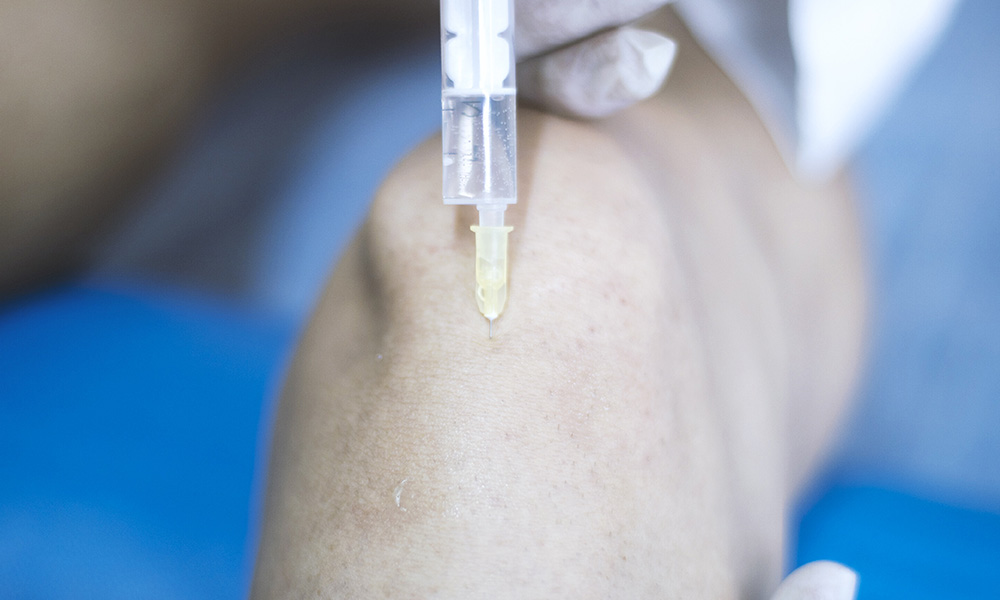The use of Platelet-Rich Plasma (PRP) for treating knee osteoarthritis (OA) has garnered significant attention due to its potential to alleviate pain and improve joint function. Below is a synthesis of evidence from recent research:
Overview of Evidence
- Mechanism of Action: PRP therapy utilizes concentrated growth factors derived from the patient’s own blood to promote tissue healing, reduce inflammation, and potentially slow cartilage degeneration.
- Comparative Effectiveness: Studies consistently show PRP’s effectiveness surpassing that of saline placebos and, in some cases, hyaluronic acid (HA) injections in reducing pain and improving function in knee OA patients.
- Safety and Tolerability: PRP is generally considered safe, with minimal adverse effects. However, the heterogeneity in preparation methods and dosing protocols poses challenges for standardization.
- Controversies and Limitations: Some studies highlight statistical fragility in outcomes and variability in patient response, emphasizing the need for standardized protocols and larger trials.
Key Studies and Findings
- Randomized Controlled Trials:
- A study by Sritharan et al. (2024) emphasized that PRP injections significantly improved pain and functional scores in knee OA patients compared to saline placebo but highlighted fragility in statistical outcomes. Read here
- Shahbaz et al. (2024) reviewed multiple trials and concluded that intra-articular PRP provides symptomatic relief in knee OA, particularly in early-to-moderate stages. Read here
- Systematic Reviews and Meta-Analyses:
- Ortega-Castillo et al. (2024) systematically analyzed studies and found that PRP offers moderate efficacy in managing osteoarthritic pain with few adverse events. Read here
- Zhang et al. (2024) examined PRP combined with high tibial osteotomy, noting enhanced efficacy and safety in treating advanced OA. Read here
- Comparative Studies:
- A comparison by Rodriguez-Merchan et al. (2024) found PRP to be more effective than HA in alleviating knee pain, with combination therapies showing additional benefits. Read here
- Controversies:
- Lo Presti et al. (2024) reported mixed results, suggesting that the efficacy of PRP may vary based on factors such as platelet concentration and injection frequency. Read here
- Emerging Insights:
- Maffulli et al. (2024) highlighted the potential of platelet lysate as an alternative to PRP, addressing some of its preparation-related shortcomings. Read here
Conclusions
PRP therapy demonstrates promise for knee OA management, offering a minimally invasive alternative that can reduce pain and improve joint function.
Here’s a polished version of your content with enhanced readability and professionalism:
Joint Injections at Rejuvence Clinic
At Rejuvence Clinic, we specialize in a comprehensive range of ultrasound-guided joint injections to address various joint and musculoskeletal conditions. Our treatments include:
- Steroid Injections
- Hyaluronic Acid Injections
- Advanced Platelet-Rich Plasma (PRP) Injections using the cutting-edge Angel® Arthrex System
Why Choose Us for PRP?
Our orthopedic specialists provide unbiased, up-to-date advice tailored to your individual needs. Rejuvence Clinic is renowned for its clinical excellence in administering state-of-the-art platelet-rich plasma (PRP) treatments. This innovative therapy supports the natural healing of joints and muscles, offering relief and improving mobility for a variety of conditions.
For further details about our PRP joint treatments and how liquid plasma can be used to treat joint and muscle conditions, click here to learn more.
Get in Touch
To book a consultation or for more information, contact us via:
- Phone: (020) 7531 6600
Let Rejuvence Clinic help you move with confidence.

